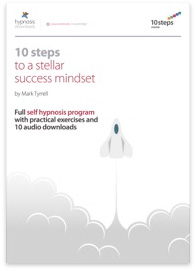What successful people never do when visualizing
Or how to give your brain the message about what you want from it
 Visualization can be your friend or foe - follow these tips to get your unconscious mind working for you.
Visualization can be your friend or foe - follow these tips to get your unconscious mind working for you."Okay then Joe," said Steve, as he hung up the phone, "The big foursome is set for Saturday!"
Steve had been waiting for this chance for months. Steve was known for being too competitive, more driven than his 16 year old truck.
Because of his competitiveness and general edginess his friends referred to him as Atila the Hun with a hangover.
And adding a little spice to the upcoming counter on the links with the Allen brothers was the fact that he didn't like either of them.
They had been successful in business and he, well, let's say he could still afford to meet the monthly minimums on his credit cards just.
"We'll need to start preparing right now," he said to Joe, his partner in the upcoming foursome of the century. "Okay Steve, get yourself physically and mentally prepared," said Joe before hanging up the phone.
Mental preparation? What mental preparation?!
"Mentally prepared?" wondered Steve, as Joe's thoughts echoed in his head. Mental preparation? Those Allen boys were always talking about mental preparation and visualizing and how helpful it was to their game.
They both claimed they had shaved several strokes off their handicap by going to a psychologist who taught them about self-hypnosis for sports and how to apply it to their golf game.
'That's baloney," Steve said to himself. "I don't need a sports psychologist to show me how to imagine winning, I can do that myself."
And so it was that Steve set about using visualization to mentally prepare for the weekend's golf game.
Steve sets out on his self-propelled visualization journey...
He decided he would set aside a few minutes before going to bed for the next three nights to visualize a successful outcome on Saturday.
On the first night, Steve imagined driving to the course. He saw himself parking his truck and getting his bag confidently out of the truck. He imagined going into the clubhouse and greeting Jerry the golf pro. He saw himself on the practise putting green.
On the second night, Steve imagined the Allen boys completely imploding. He saw Bill, the younger brother, missing a tap-in. He visualized Dave slicing a tee shot horribly into the trees. He imagined them both hitting into the water on the same hole. It was fun.
On the third night, Steve visualized hitting the ball like he had never hit it before. He visualized making a hole in one on the par four first hole by driving the ball 350 yards directly into the cup.
On the first par five hole, he imagined driving a shot perfectly into the cup for an albatross or double eagle. He visualized holing out from the difficult sand trap at the seventh.
Steve was very satisfied with his preparation. He had never thought so much about the mental side of his game.
Why Steve's vizualisation didn't work (and the Allens' did)
Meanwhile, the Allen boys were going through their visualizations. They weren't visualizing things that weren't relevant to their performance, like driving to the course or greeting Jerry the head pro.
This was particularly helpful when Saturday rolled around and some unexpected course maintenance meant that the foursome had to switch not only tee times but the very course they'd be playing.
That threw Steve for a loop.
The Allens did visualize the feeling of a smooth swing, sweet contact with the ball, and making medium length putts. They saw, and felt, themselves hitting the ball smoothly. Funnily enough, in one of their early sessions with Dr. Bob, the sports psychologist, they had raised the question of visualizing opponents playing poorly.
Keeping your brain's eye on the prize
"There are two reasons you don't want to do that," advised Dr. Bob. "First, visualization is about improving your performance because you can control that. You can't control other people," the psychologist said.
"Second, and this is more important, imagining someone else playing a bad shot negatively impacts your own game. From a visualization point of view, the brain doesn't distinguish between your shot or someone else's. Imagining a poor shot, whoever's it is, plants that idea of a bad shot in your subconscious and will come back to haunt you," explained Dr. Bob.
"Visualize the possible. Be Realistic because this about improving your performance not fantasizing that you're a Superhero," said Dr. Bob.
The Allen's enjoyed the game on Saturday a lot and well and truly cleaned up with all their winning bets. Joe was playing pretty well but, for some reason, Steve was completely off his game. He seemed utterly frustrated as he walked off at the eighteenth.
"Steve, have you ever thought of going to a sports psychologist?" said Bill as they followed Steve off the course.
"He can't afford to, after today," quipped Dave.
10 Steps to a Stellar Success Mindset course
Let hypnosis drive success habits deep into your unconscious mind...




